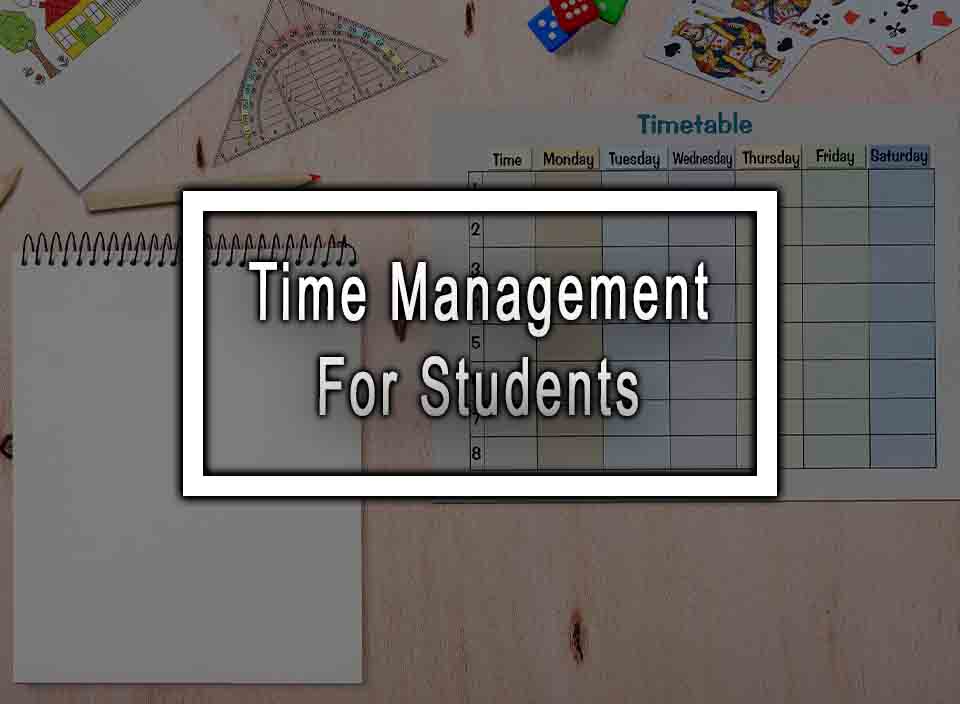Table of Contents
ToggleHere Are Some Tips For Time Management For Students
Time management is an essential skill that every student should have. It is crucial in ensuring students’ academic success and personal growth. Managing time effectively is all about making the most of your day, by maximizing productivity and ensuring that you are efficient in everything you do. Time management skills can help reduce stress, prevent procrastination, and improve academic performance. In this article, I will provide tips and strategies for time management for students.
Create A Schedule
Creating a schedule is the first step to effective time management. In your schedule, you should outline all of your activities for the day, week, or month. Prioritize tasks that need to be done urgently and allocate reasonable amounts of time for each task. A schedule helps you keep track of what you need to do, when you need to do it, and how long it will take. This way, you can avoid overcommitting yourself and ensure you have ample time to complete all tasks.
Make A To-Do List
To-do lists are an important tool for effective time management. They help you organize your tasks and prioritize them. To-do lists can be made either on a daily or weekly basis. The most important thing is to make a list of tasks that need to be done. You can use apps like Todoist, Trello, or Google Tasks to create your to-do lists. You can also make a simple handwritten to-do list and carry it with you to stay on track. Once you’ve completed a task, cross it off your list. This way, you can feel a sense of accomplishment, and you can motivate yourself to keep going.
Eliminate Distractions
Distractions can be detrimental to effective time management. They impede productivity and can cause you to lose focus. Common distractions include social media, television, phone notifications, and unnecessary interruptions. Try to reduce or avoid distractions where possible. You can switch off your phone or put it on silent mode. You can also use apps like Freedom, which limit access to social media sites during study sessions. Additionally, you can consider studying in a quiet room away from noise and other disturbances.
Break Tasks into Smaller Chunks
Breaking tasks into smaller chunks can help you manage your time effectively. Large projects can be overwhelming, and they can make you feel like you don’t have enough time to complete them. However, if you break them down into smaller tasks, it becomes easier to manage your time. You can focus on one task at a time and make progress bit by bit. Breaking tasks into smaller chunks can help you avoid procrastination, and it can make your work more manageable and less overwhelming.
Take Breaks
Taking breaks is an essential aspect of effective time management. It can help you recharge and increase your productivity. Taking short breaks can help you avoid burnout and enhance your focus. It’s crucial to find an appropriate balance between work and breaks. You can take a 10-minute break after an hour of study, or you can take a longer break after completing a particular task. During your breaks, you can do something that refreshes your mind and helps you relax, such as taking a walk, reading a book, or listening to music.
Conclusion
Time Management For Students – Effective time management is an important skill that every student should learn. It can help you become more productive, reduce stress, and achieve your academic goals. To manage your time effectively, you should create a schedule, make to-do lists, eliminate distractions, break tasks into smaller chunks, and take breaks. Remember to prioritize your goals and focus on what’s important. Ultimately, time management is about using your time wisely, making the most of every minute, and achieving success.
Time Management For Students FAQ
Here are the most common questions about time management for students.
Why is important time management for students?
Time management is important for students because it allows them to prioritize their tasks, manage their workload effectively, and achieve their academic goals. Effective time management also helps students to avoid stress and burnout while maintaining a good work-life balance.
How can students balance their academic work with other commitments?
To balance academic work with other commitments, students can prioritize their tasks, allocate specific times for each activity, and plan their schedules accordingly. They can also streamline their work processes by delegating tasks, using technology to manage their tasks, and learning to say no to non-essential commitments.
What are some common time wasters that students should avoid?
Some common time wasters that students should avoid include social media, TV, video games, procrastinating, multitasking, and spending too much time planning and organizing without actually doing anything.
How can students overcome procrastination?
To overcome procrastination, students can break tasks down into smaller, more manageable chunks, use timers or deadlines to create a sense of urgency, eliminate distractions, and create a supportive environment that minimizes the potential for procrastination. They can also practice positive self-talk and reward themselves for meeting objectives.
How can students maintain a healthy work-life balance while managing their time?
To maintain a healthy work-life balance, students can prioritize their tasks, plan their schedules, and set realistic goals with specific timelines. They can also incorporate leisure activities, exercise, and socializing into their schedules to avoid burnout and maintain overall well-being.
How can parents or teachers help students with time management?
Parents or teachers can help students with time management by setting expectations, providing guidance and support, and modeling effective time management skills. They can also offer help with creating schedules and prioritizing tasks, as well as providing tools and resources, such as organizers or study aids. Consistent communication and feedback can also be helpful in keeping students on track.
More like this: What Are The Benefits Of Acupressure











